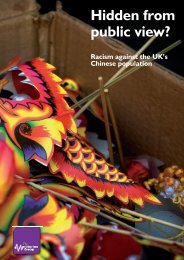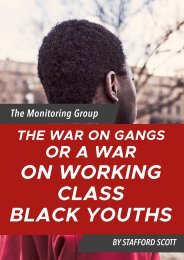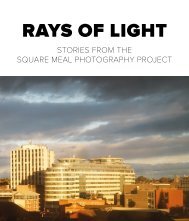Coming of Age : 1976 and the Road to Anti-Racism
Coming of Age : 1976 and the Road to Anti-Racism by Jagdish Patel and Suresh Grover
Coming of Age : 1976 and the Road to Anti-Racism
by Jagdish Patel and Suresh Grover
You also want an ePaper? Increase the reach of your titles
YUMPU automatically turns print PDFs into web optimized ePapers that Google loves.
Some issues, however, embraced <strong>the</strong> whole community more directly. For, apart from <strong>the</strong> general question<br />
<strong>of</strong> wages, conditions <strong>of</strong> work, etc., quite a few <strong>of</strong> <strong>the</strong>se strikes also involved ‘cultural* questions, such as <strong>the</strong><br />
right <strong>to</strong> take time <strong>of</strong>f for religious festivals, <strong>the</strong> right <strong>to</strong> break <strong>of</strong>f for daily prayer (among Moslems), <strong>the</strong> right<br />
<strong>of</strong> Sikh busmen <strong>to</strong> wear turbans instead <strong>of</strong> <strong>the</strong> <strong>of</strong>ficial head-gear. And because <strong>of</strong> trade union opposition <strong>to</strong><br />
such practices’, <strong>the</strong> struggles <strong>of</strong> <strong>the</strong> class <strong>and</strong> <strong>the</strong> struggles <strong>of</strong> <strong>the</strong> community, <strong>of</strong> race, became indistinguishable.<br />
These in turn were linked <strong>to</strong> <strong>the</strong> struggles back ‘home’ in <strong>the</strong> sub-continent – if only through family obligations arising<br />
from economic need. Predicated by under-development caused by imperialism. The connections were immediate,<br />
palpable, personal. in was not a thing apart, a <strong>the</strong>oretical concept; it was a lived experience – only one removed<br />
from <strong>the</strong> experience <strong>of</strong> racism itself. And for that reason, <strong>to</strong>o, <strong>the</strong> politics <strong>and</strong> <strong>the</strong> political organisations <strong>of</strong> <strong>the</strong> ‘home’<br />
counties had a bearing on <strong>the</strong> life <strong>and</strong> Indian <strong>and</strong> Pakistani settlers in Britain now – not just in terms <strong>of</strong> elec<strong>to</strong>ral political<br />
parties so much as in terms <strong>of</strong> <strong>the</strong> resistance movements <strong>to</strong> <strong>the</strong> authoritarian state (26) — which, in turn. had<br />
resonances for <strong>the</strong>m in Britain. Asian-language newspapers kept <strong>the</strong>m in constant <strong>to</strong>uch with events in <strong>the</strong> subcontinent,<br />
<strong>and</strong> <strong>the</strong> political refugees whom <strong>the</strong>y housed <strong>and</strong> looked after not only involved <strong>the</strong>m in <strong>the</strong>ir movements,<br />
but fired <strong>the</strong>ir own resistances. Reciprocally. <strong>the</strong>ir people back ‘home’ were keened <strong>to</strong> <strong>the</strong> mounting racism in Britain.<br />
On all <strong>the</strong>se fronts, <strong>the</strong>n, blacks by 1968 were beginning <strong>to</strong> fight as a class <strong>and</strong> as a people. Whatever <strong>the</strong> specifics<br />
<strong>of</strong> resistance in <strong>the</strong> respective communities <strong>and</strong> however different <strong>the</strong> strategies <strong>and</strong> lines <strong>of</strong> struggle, <strong>the</strong><br />
experience <strong>of</strong> a common racism <strong>and</strong> a common fight against <strong>the</strong> state united <strong>the</strong>m at <strong>the</strong> barricades. The mosaic<br />
<strong>of</strong> unities observed earlier resolved itself, before <strong>the</strong> onslaught <strong>of</strong> <strong>the</strong> state, in<strong>to</strong> a black unity <strong>and</strong> a black struggle.<br />
It would recede again when <strong>the</strong> state strategically retreated in<strong>to</strong> urban aid programmes <strong>and</strong> <strong>the</strong> creation<br />
<strong>of</strong> a class <strong>of</strong> black collabora<strong>to</strong>rs — only <strong>to</strong> be forged anew by ano<strong>the</strong>r generation, British-born but not British.<br />
In March 1968 <strong>the</strong> Labour government passed <strong>the</strong> Kenyan Asian Act this time barring free entry <strong>to</strong> Britain <strong>of</strong> its citizens<br />
in Kenya — because <strong>the</strong>y were Asians. O.K. so <strong>the</strong>y held British passports issued by or on behalf <strong>of</strong> <strong>the</strong> British<br />
government, but that did not make <strong>the</strong>m British, did it? Now, if <strong>the</strong>y had a parent or gr<strong>and</strong>parent born, naturalised,<br />
or adopted in <strong>the</strong> UK — like those chaps in Australia, New Zeal<strong>and</strong> <strong>and</strong> places — it would be a different matter. But<br />
<strong>of</strong> course <strong>the</strong> government would set aside a quota <strong>of</strong> entry vouchers especially for <strong>the</strong>m - for <strong>the</strong> Asians, that is. The<br />
reasons were not racial as Prime Minister Wilson pointed out <strong>to</strong> <strong>the</strong> Archbishop <strong>of</strong> Canterbury, ‘geographical’. (27)<br />
Between conception <strong>and</strong> passage <strong>the</strong> Act had taken but a week. The orchestration <strong>of</strong> public opinion that preceded<br />
it had gone on for a year, but it had risen <strong>to</strong> a crescendo in <strong>the</strong> last six months. Enoch Powell, man <strong>of</strong> <strong>the</strong> people, had<br />
warned <strong>the</strong> nation that <strong>the</strong>re were ‘hundreds <strong>of</strong> thous<strong>and</strong>s <strong>of</strong> people in Kenya’ (28) who thought <strong>the</strong>y belonged <strong>to</strong><br />
Britain ‘just like you <strong>and</strong> me’. In January <strong>the</strong> press came out with scare s<strong>to</strong>ries, as it had done before <strong>the</strong> Immigration<br />
Act <strong>of</strong> 1962, except this time it was not smallpox but <strong>the</strong> cl<strong>and</strong>estine arrival <strong>of</strong> hordes <strong>of</strong> Pakistanis. In February<br />
Powell returned <strong>to</strong> his <strong>the</strong>me — <strong>and</strong> o<strong>the</strong>r politicians joined in. Later in <strong>the</strong> month <strong>the</strong> Daily Mirror, <strong>the</strong> avowedly<br />
pro-Labour paper. warned <strong>of</strong> an ‘uncontrolled flood <strong>of</strong> Asian immigrants from Kenya’. On 1 March <strong>the</strong> bill was passed.<br />
Blacks were enraged. They had lobbied, petitioned, reasoned, demonstrated — even campaigned alongside<br />
whites in NCCI’s Equal Rights set-up — <strong>and</strong> had made no impact. But <strong>the</strong> momentum was not <strong>to</strong> be lost. Within<br />
weeks <strong>of</strong> <strong>the</strong> Act Jagmohan Joshi, Secretary <strong>of</strong> <strong>the</strong> IWA Birmingham, was urging black organisations <strong>to</strong> form<br />
<strong>Coming</strong> <strong>of</strong> <strong>Age</strong> | 49<br />
<strong>Coming</strong> <strong>of</strong> <strong>Age</strong> Final version 16.10.indd 49 17/10/2017 12:07







